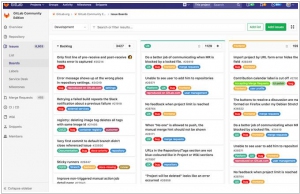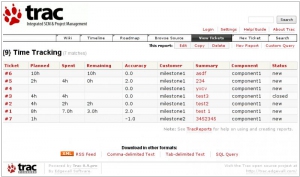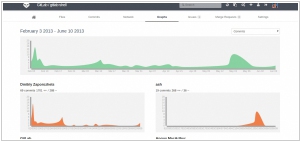Gitlab vs Trac
May 19, 2023 | Author: Michael Stromann
14

GitLab offers git repository management, code reviews, issue tracking, activity feeds and wiki’s. Enterprises install GitLab on-premise and connect it with LDAP and Active Directory servers for secure authentication and authorization. A single GitLab server can handle more than 25,000 users but it is also possible to create a high availability setup with a multiple active servers.
7

Trac is an alternative wiki and issue tracking system for software development projects. Trac uses a minimalistic approach to web-based software project management. Our mission is to help developers write great software while staying out of the way. Trac should impose as little as possible on a team's established development process and policies.
See also:
Top 10 Issue and Bug Trackers
Top 10 Issue and Bug Trackers
GitLab and Trac are both widely used tools in software development, but they have distinct features and focuses. GitLab is primarily known as a web-based Git repository manager and a comprehensive DevOps platform. It offers features like version control, continuous integration/continuous deployment (CI/CD), code review, issue tracking, and project management tools. GitLab emphasizes collaboration, automation, and a seamless workflow for development teams. On the other hand, Trac is a lightweight issue tracking system that integrates tightly with version control systems like Subversion and Git. It provides features like issue tracking, wiki documentation, and a simple web interface. Trac is known for its simplicity, ease of use, and integration with version control systems.
See also: Top 10 Issue Trackers
See also: Top 10 Issue Trackers
Gitlab vs Trac in our news:
2015. Collaboration platform for developers GitLab raises $4M

GitLab, the open source Git-based collaboration platform for developers, has announced that it successfully secured $4 million in Series A funding. The company provides a free community edition, a free SaaS version, and a paid enterprise edition of its service. With the newly acquired funding, GitLab aims to expedite its growth and expand its global operations. Git has become the go-to method for code management among numerous development teams. While GitHub stands as the most well-known Git-hosting service, there exist several competitors in this realm, each offering their own unique approach and user interface on top of the fundamental hosted Git concept. Atlassian, for instance, provides both free and paid Git hosting services. What sets GitLab apart from some of these competitors is its strong emphasis on its open source solution.
2006. Trac - web-based project management with wiki + bug-tracker + svn code browser

Trac emerges as a fresh contender in the realm of issue tracking tools, offering a delightful web-based project management solution developed in Python. One of its key strengths lies in its seamless integration with existing Subversion repositories. With Trac, you can conveniently browse the code within your repositories, complete with syntax highlighting, and effortlessly view differences between revisions. Notably, Trac goes beyond version control integration and extends its capabilities to include a wiki feature for project documentation. Moreover, it incorporates a built-in bug tracker reminiscent of Bugzilla, resulting in a comprehensive, all-in-one software solution. It's important to note that Trac is Free Software, and although its license recently transitioned from GPL to the revised BSD license, it continues to uphold its open-source principles. To enhance Trac's functionality, you can explore a wide array of useful plugins and macros available at trac-hacks.org. These include noteworthy additions such as DoxygenPlugin, GanttPlugin, DebianBtsMacro, and many others, enabling you to tailor Trac to your specific needs and requirements. Discover the power and versatility of Trac for effective project management and issue tracking.



